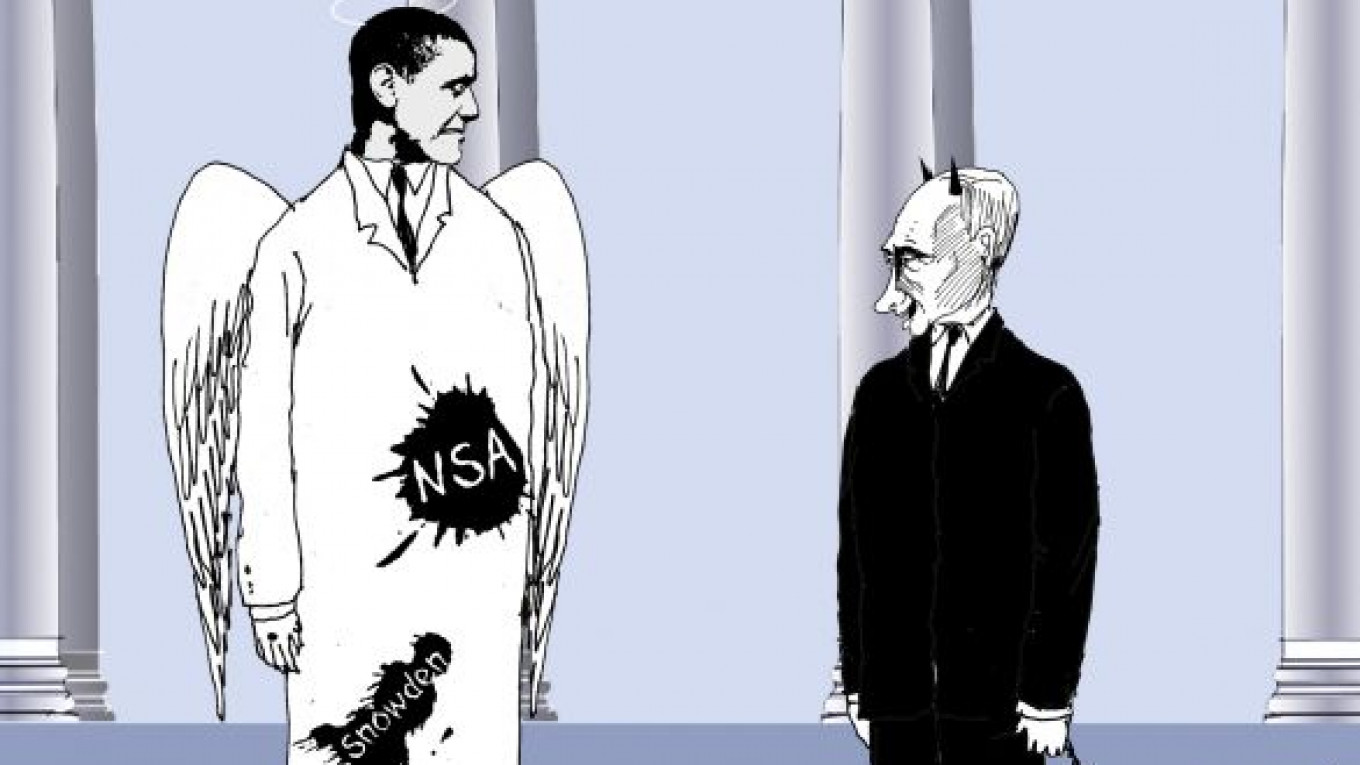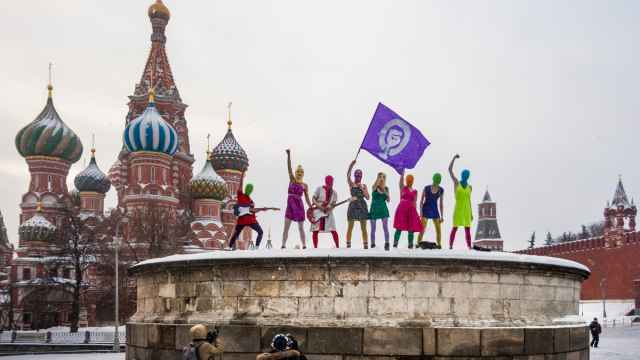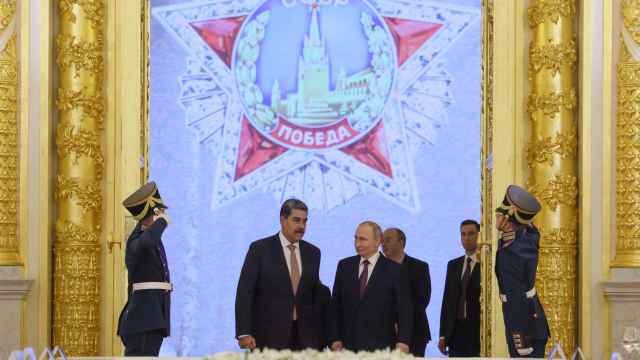A worldwide media frenzy has turned the plight of the rogue U.S. intelligence analyst Edward Snowden into something resembling a John le Carre novel, full of suspense and intrigue. Whose spy is he? Who will grant him asylum? What will U.S. President Barack Obama say to President Vladimir Putin at their scheduled meeting in Moscow, where Snowden is currently taking refuge at Sheremetyevo Airport, this September? Or will Obama simply cancel the meeting if Snowden is still in Russia in early September?
The real espionage, however, lies not in Snowden's decision to release National Security Agency secrets but in the surveillance programs that he exposed. The leaked information highlighted the West's long-ignored failure to strike an informed balance between security and liberty. Current political and economic uncertainty has exacerbated the situation, driving policymakers to settle on simplistic solutions that, as Snowden made starkly apparent, can undermine the values that the West espouses.
A country that emphasizes security over civil rights and liberties is easily hijacked by its own security agencies.
This is not true only in the U.S. and Britain, which happen to be entangled in the Snowden scandal. The reluctant responses by Germany and France to evidence that the NSA has been conducting unprecedented surveillance of their officials indicate that Europe's governments may also be involved. Indeed, it now appears that the U.S. has shared its intelligence trove with Germany's spy services when needed.
So far, Obama's handling of the Snowden affair shows that he places more stock in the logic of security than in adherence to principle. Coming from a president who won global sympathy — and a Nobel Peace Prize — for his moral stance, the claim that the NSA's activities are justified because "that's how intelligence services operate" is particularly disappointing.
A state that emphasizes security over civil rights and liberties is easily hijacked by security agencies. While the U.S. "war on terror" demands a stronger emphasis on security, the NSA's activities expose an alarming willingness to violate the privacy of millions of individuals —including in allied countries, whose constitutions and sovereignty have also been breached.
Western leaders must now ask themselves whether the ends justify the means. With the all-powerful U.S. mobilizing its resources to bring Snowden back to the U.S. to face serious charges, the answer appears to be no. In any event, the current scandal's impact on Obama's image increasingly resembles the impact of the Watergate scandal on President Richard Nixon's standing in the 1970s — only now the events are playing themselves out on a global stage.
But Obama is not really the problem. At the heart of the issue is a model of liberal democracy that fails to respond to challenges that contradict the values it is supposed to uphold. In fact, Snowden's warning that "any NSA analyst, at any time, can target anyone, from a federal judge to the president" suggests that NSA head Keith Alexander could already be more powerful than Obama.
Monitoring individuals' private lives is not limited to the state and its security services. Major global telecommunication companies — such as Google, Microsoft, Facebook and Skype — have assembled secret stockpiles of personal information about their users, which they share with the NSA.
Beyond the obvious violation of individuals' privacy implied by such activities lies the danger that these firms will later make a deal with authoritarian regimes in Russia or China, where little, if any, effort is made to preserve even the illusion of privacy. Google already has some experience in turning over information to China's security services. Against this background, it is impossible to know whether these companies are already spying on Western leaders, together with the NSA.
Snowden's presence in Russia, even in the airport's international transit zone, has given the U.S. a pretext to declare that he is not a whistleblower, but a traitor. The fact that Snowden has now applied for temporary asylum in Russia has reinforced that interpretation. Ironically, by turning the affair into a spy thriller, Putin has helped the U.S. to deflect some of the attention from the NSA's surveillance programs.
The discussion about security, privacy and freedom that the Snowden drama has sparked is long overdue. But the scandal has produced many losers. Snowden has effectively given up his future. The U.S. and Obama have lost their claim to the moral high ground. And liberal democracies' apparent inability to protect their citizens from infringement of their individual rights has undermined their standing at home and abroad.
Russian society will also pay a price, with the NSA's surveillance programs giving the Kremlin ammunition to defend the expansion of state control over the Internet and other aspects of citizens' personal lives. Similarly, the scandal will likely inspire China to strengthen its Great Firewall further.
The ordeal's only victor is Putin, who now has grounds to dismiss U.S. criticism of his authoritarian rule. Indeed, at the slightest provocation, Putin will be able to point to U.S. hypocrisy for spying on European Union facilities, for example, as part of expanded surveillance programs supposedly within the scope of the war on terror. Putin can also say that the U.S. persecution of Snowden and attempts to prosecute him are politically motivated in response to U.S. claims that Russian authorities unfairly prosecuted whistleblower Sergei Magnitsky.
Snowden did not create the security-privacy dilemma, but he did illuminate a deeply rooted problem that Western leaders have long tried to obscure. One can only hope that his actions, and the resulting scandal, will compel Western leaders to reassess their approach to national security — and not simply prompt them to conceal it better.
Lilia Shevtsova is senior associate at the Carnegie Endowment for International Peace in Moscow. © Project Syndicate
A Message from The Moscow Times:
Dear readers,
We are facing unprecedented challenges. Russia's Prosecutor General's Office has designated The Moscow Times as an "undesirable" organization, criminalizing our work and putting our staff at risk of prosecution. This follows our earlier unjust labeling as a "foreign agent."
These actions are direct attempts to silence independent journalism in Russia. The authorities claim our work "discredits the decisions of the Russian leadership." We see things differently: we strive to provide accurate, unbiased reporting on Russia.
We, the journalists of The Moscow Times, refuse to be silenced. But to continue our work, we need your help.
Your support, no matter how small, makes a world of difference. If you can, please support us monthly starting from just $2. It's quick to set up, and every contribution makes a significant impact.
By supporting The Moscow Times, you're defending open, independent journalism in the face of repression. Thank you for standing with us.
Remind me later.






